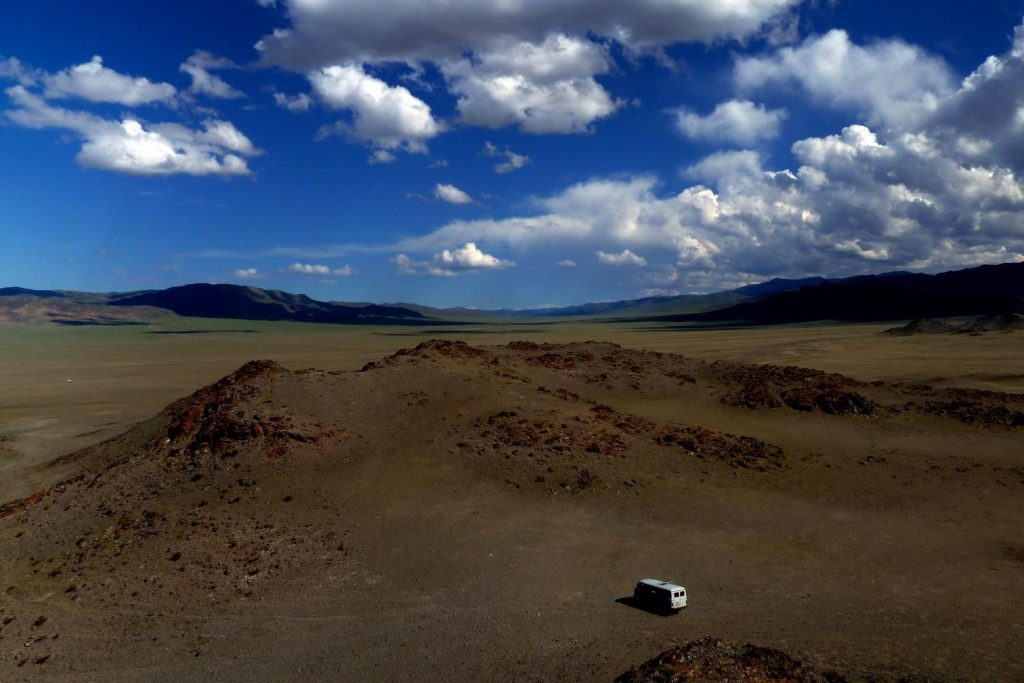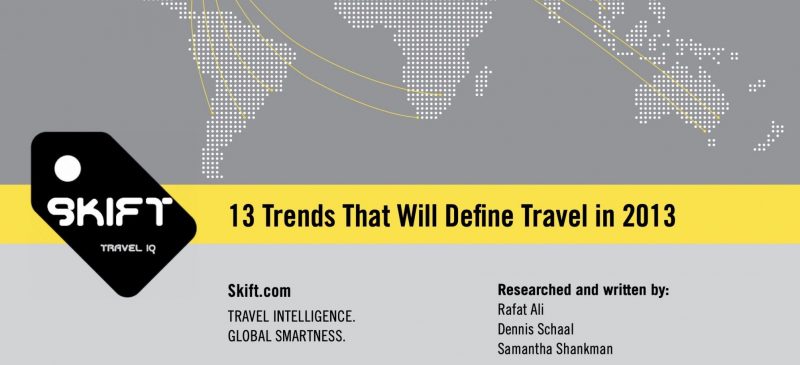Calling Travel's Future Without Fear Then and Now on Skift's 9th Anniversary

Skift Take
In early 2013, five months after Skift's official launch, we predicted that last-minute hotel bookings on mobile phones would become the norm, and that paying fees for ancillary services, from checked bags to spa appointments, would become second nature.
Looking back — Covid notwithstanding — we did a credible job in highlighting our predictions of 13 pertinent travel trends, with some of our forecasts so on point that today the things we envisioned in 2013 are now merely taken for granted.
While we nailed many of the 13 Global Trends That Will Define Travel in 2013, we missed the mark on a few, and others are nuanced or require further explanation.
As a grizzled Skift veteran who, along with my colleagues around the world, is marking Skift's ninth anniversary Friday, I recall fondly that founder Rafat Ali, reporter Samantha Shankman, and myself researched and wrote the 13 Trends That Will Define Travel in 2013 from a cramped co-working space, AlleyNYC, on 7th Avenue in Manhattan.
Skift was just finding its footing in travel media, and our 2013 prognostications about key travel trends ultimately evolved over the years into our annual Megatrends franchise, which pre-Covid included global events and the magazine.
I've noticed over the years that so many other companies, from media competitors to major publicly traded online travel agencies, have hopped aboard our future of travel formulations and published their own because that's what travel business executives are dying to find out about.
Over the years, we developed Skift's core values, and they are the foundation of what energizes our annual Megatrends publication — now a collaboration of the Skift Editorial and Research Departments — over the course of several months annually. We didn't even have a Research Department when we issued our initial 13 Trends in 2013.
Among those core values that fuel our annual Megatrends deliberations are: "Always come up with new ways & perspectives of looking at the world," and "Always, always do our own thing, without fear."
That always guided us and in Skift's early days we were loved, resented and respected simultaneously. The word "Skift" means "shift" or "change" in the Nordic languages, and we were unafraid of rocking the powers that be in travel media when we came on the scene, predicting that we'd become the homepage of the travel industry. Our critics dismissed us at the time, but you judge for yourself how that boast turned out.
Of course, when you are making sometimes-daring and contrarian predictions, we can always take solace in our mantra, "Fuck it, let's do it."
On our ninth anniversary at Skift, we thought it would make for an interesting story to look back at a few of these key trends, and see how they turned out.
So the following are thoughts on some of the Trends we stood behind in January 2013.
Everyone Wants a Chinese Tourist — Mostly Correct
We gushed that in 2012 that the 1 billion international tourist milestone had been reached. By pre-pandemic year 2019, according to the World Tourism Organization, that number rose 50 percent to 1.5 billion, and about 155 million of these global wanderers were from China.
Hotels in many destinations indeed started stocking Mandarin-language menus and informational packets, and designer clothes stores on the Champs-Élysées began accepting WeChat Pay and Alipay. So Chinese tourists, once international travel resumes in earnest, may indeed once again be coveted guests.
The only caveats we'd raise are that the world has become even more polarized in the interim, and some destinations coming out of the pandemic are rethinking tourism's impact on local populations.
U.S.-China tensions came to the fore, and China and South Korea were at loggerheads for a time over deployment of a U.S. missile defense system. These sorts of disputes, temporary or enduring as they might be, serve as a drag on Chinese outbound tourism with travelers diverted instead to closer destinations such as Hong Kong, Macau or Thailand.
Destinations sensitive to overtourism, in particular, could blunt enthusiasm at times for Chinese and other visitors.
Speaking of overtourism, we are proud of some of the terms over the years that Skift either coined or punctuated. Among them are overtourism, hate-selling, supertraveler, and permanxiety.
Ancillary Fees Are the New Normal —Bingo, Yes
Yes, today we reflexively pay — like it or not — fees on everything from checked bags to airline seat assignments.
As IdeaWorks wrote in in June 2021: For many airlines, revenue from seat assignment sales has moved up the income statement from a minor presence to a strong #2 spot. For some, this can be a billion-dollar result, and for every other airline it’s a multi-million-dollar business."
OK, we didn't predict the proliferation of hotel resort fees in some geographies, but that fits right into the trend.
Last-Minute Mobile Hotel Booking — Amen
In 2013, we talked about how HotelTonight was a single-minded and mobile-only app for same-day hotel bookings. Much has changed: Acquired by Airbnb in 2019, HotelTonight now has a website, and you can book a room up to 100 days in advance — in addition to that night at 10 p.m.
But as with many other apps, same-day hotel bookings on your phone are a staple of hotel-booking now. Other than price and availability questions during big events, why book ahead when you can procrastinate until later that night?
The Rise of Price Transparency — Yes, But
We said in 2013 that price transparency would become the norm. It certainly has become a major concern and has triggered regulatory action.
In 2019, following pressure from the European Commission and the Norwegian Consumer Authority, Airbnb starting displaying the total price upfront on the first page of listings for specific dates — for travelers in Europe. But you won't necessarily see the total price, including cleaning fees, in the U.S., for example, where regulation has been relatively lax.
The European Commission in 2020 likewise pushed Booking.com and Expedia to display the total price of accommodations, including mandatory fees.
But while there is heightened attention to the issue by some regulators, price transparency remains a mess outside of Europe, and gotcha fees and the actual total price often come as unwelcome surprises to travelers.
Foodies Yes, and Bleisure Travel Interrupted
We were on the mark when we said in 2013 that food tourism would become a major thing. Think of all the travelers who Instagram-pick their desired destinations based on photos of Hawaiian short ribs or pork noodles in Malaysia.
The global culinary tourism market was valued at $1,1 trillion in 2019, according to Research and Markets, and is expected to reach a market value of $1.8 trillion by 2027, registering a compound annual growth rate of of 16.8 percent from 2020 to 2027.
In 2013, we forecast that arbitrary distinctions between business and leisure travel would be muddied in the future, and bleisure travel — tacking on some vacationing to your business trip — would pick up momentum, which it did.
However, Covid-19 erased business travel in many parts of the world, but the bleisure trend will certainly rise a new in a post-pandemic world.
Digital Maps as a Key Battleground — Yes and No
In the West, Google has certainly turned Google Maps, where you can do everything from sorting your mass transit options to booking a spa or hotel, has certainly put the fear of god into competitors.
But while some consider Google Maps to be the next potential superapp, those superapps themselves, from WeChat and Alibaba in China to Grab in Singapore, have supplanted maps as bigger battlegrounds for travel competition.
The Lure of Myanmar — Nope
In 2013, we wrote about the "Lure of the last unknown: The rise of Myanmar." While Myanmar trended as a travel destination for awhile, and Myanmar tourism even secured a booth at a Pacific Asia Travel Association event three years ago in Malaysia, the Myanmar military crushed any semblance of democracy there, and carried out genocide, reversing the luster of a destination that was trending.
Hey, as we mark Skift's 9th anniversary on July 30, 2021, in a world that is still being ravaged my Covid-19 nearly two years into the pandemic, we are already game-planning our Megatrends forecasts for next year.
If the past is a predictor of the future, we'll be bold in our Megatrends predictions, and we'll do so without fear.
Founding and Executive Editor Dennis Schaal was technically Skift employee No. 1, hired by Founder Rafat Ali and Co-Founder Jason Clampet. So he has celebrated all nine anniversaries.
Editor's Note: The lead photo for this story was taken by Skift Founder Rafat Ali in the Mongolian desert, part of his solo world travels prior to launching Skift.







